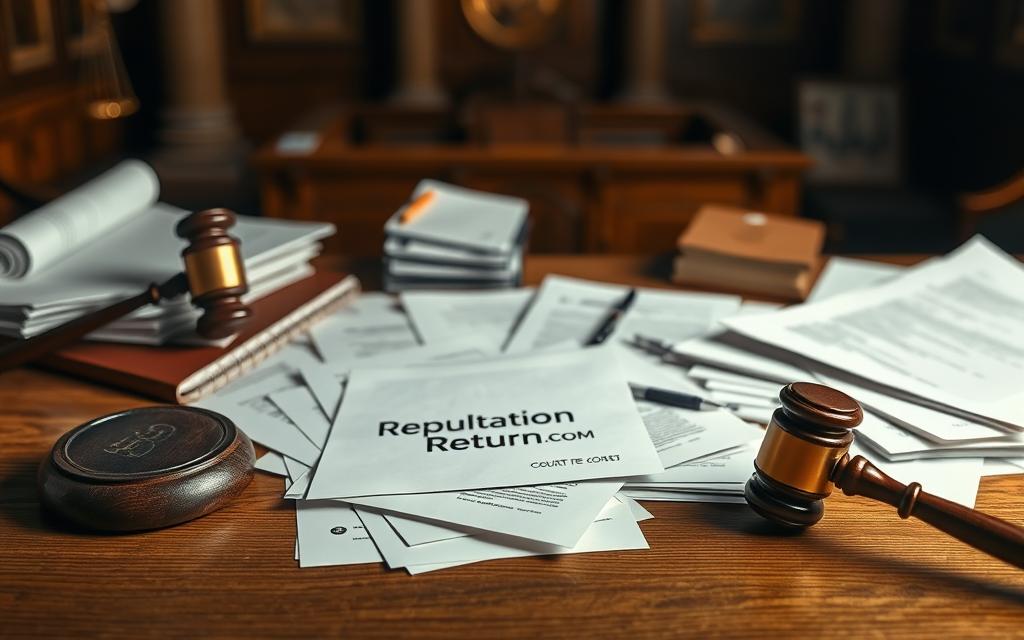Seeing court records show up in Google search results can really hurt your reputation. This article will look at how court records affect your online image. It will also cover ways to hide or remove them from Google. Plus, it will talk about managing your online reputation to fix this issue.
More and more people are finding their arrest records and mugshots online. Many sites in the U.S. ask for money to take down your info. This leaves you with a tough and expensive problem. Companies that manage your online reputation offer services like hiding content to keep your info off the first page of search results. But, asking for removal can take a lot of time and money.
Even if you try hard, public court records might come back in search results. This can happen if a mugshot site looks for missing info again. It’s very important to fix and manage your online reputation to avoid long-term damage. This helps protect your job and your well-being.
What Are Court Documents and Why They Appear on Google
Before, finding public court records meant going to a courthouse and asking a clerk. Now, the internet lets us easily find these records online. Websites collect and share this info. Court records from various legal cases, like lawsuits and criminal cases, are indexed by Google. This makes them public and can harm someone’s reputation.
The Accessibility of Court Records Online
Many websites, like Leagle, Justia, Casetext, and PacerMonitor, gather and share public court records. This makes them easy to find with Google court record search. Now, court records Google can show up in search results, affecting people’s reputations.
- Public court records are open to everyone in the U.S.
- Some private info, like social security numbers and adoption cases, is kept private.
- Google’s algorithm shows these records in search results, which can hurt someone’s online image.
Now, public court records online are easy to find. This lets employers, landlords, and others check them out. This can greatly affect people and businesses.
The Impact of Court Records on Personal and Professional Reputation
Having court records show up in your Google search can really hurt your personal and work life. Potential employers, landlords, and even people you might date can find these records. They might think less of you, making it hard to get a job, a place to live, or a partner. Court records can really affect your online reputation in big ways.
A court record from a past legal issue can stop you from getting a new job. Even if it was a small matter or you’ve moved on, employers often check your background. They might see the record as a warning sign, which could block your career growth.
Also, court records can mess with your love life. When someone searches for you online, they might find things that make them question your character. This can make it tough to form deep connections with others.
Court records can really change how people see you and can affect many parts of your life. It’s key to know how to manage your online presence and take steps to lessen the impact of these records.
- The “right to be forgotten” was established in the European Union in May 2014 as a result of a ruling by the European Court of Justice.
- In 2018, the EU adopted the General Data Protection Regulation (the GDPR) which includes a ‘right to erasure’ similar to the right recognized by the European Court of Justice.
- Some countries outside the European Union have adopted laws similar to the right to be forgotten, for example, Russia, Turkey, and Serbia.
suppress court documents Google
Dealing with court documents that show up in Google search results can be tough. There are ways to hide or remove this info. Options include legal steps like expungement and link suppression. These can help you control what people see online about you.
Expungement: Sealing Court Records
Expungement is a key way to hide court records from Google. It means asking the court to seal your records so they’re not public. But, you must meet certain state laws to qualify, so talk to a lawyer first.
Link Suppression: Pushing Down Negative Content
If you can’t expunge your records, try link suppression. This means making a strong online presence with good content. Sites like LinkedIn, Yelp, and Manta are good for this. By having more positive content, you can push the bad court records down in Google.
Complete Removal: A Case-by-Case Approach
In some cases, you might get court records removed from websites. This is tricky and needs legal knowledge and talks with website owners.
Handling court documents on Google can be hard, but with the right steps and advice, you can manage your online image. This helps you control sensitive info.

| Website | Indexed Pages | Domain Authority |
|---|---|---|
| CaseText.com | 4.1 million | 65 |
| CourtListener.com | 1.3 million | 69 |
| Leagle.com | 16,000+ | 67 |
| PacerMonitor | 600,000+ | – |
These numbers show how hard it is to remove court records from Google. Sites like CaseText and CourtListener are big and powerful. Using expungement, link suppression, and removal requests can help you manage your online image.
Understanding the Process of Expungement or Sealing Court Records
Removing court records from Google search results can be done through expungement or sealing. This legal process gets a court order to hide or seal the records. They become private and not available to the public or search engines. To qualify for expungement, you must meet certain requirements like the crime type, time since the crime, and finishing your sentence.
Sealing a record hides it from the public, but some groups like law enforcement can still see it. The steps to remove court records legally differ by place and case details.
Steps to Expunge or Seal Court Records
- Check if you qualify: See if you can expunge or seal your records based on the crime and time since then.
- File a Petition: Get and submit a petition to the court where your case was heard, asking to clear or seal your records.
- Attend a Hearing: Go to a court hearing where a judge will look at your petition and decide if your records can be cleared or sealed.
- Get a Court Order: If your petition is okayed, the court will give you an official order to clear or seal your records, hiding them from the public and search engines.
The legal process to remove court records is complex. It’s wise to get help from an attorney who knows about expungement or sealing court records. They can help you with the steps and make your chance of success better.
Link Suppression: Pushing Down Negative Court Records on Google
If you can’t get your court records expunged or sealed, link suppression is a good option. This method means making positive or neutral content that ranks higher on Google than the negative court links. By using personal websites, social media, and high-quality content on industry platforms, you can hide the court record links. This reduces their visibility and impact on your online reputation.
Link suppression lets you take charge of your online image. Instead of waiting for the negative records to go away, you boost your positive side. This approach not only hides the court records but also shows your skills, achievements, and good qualities to others online.
Strategies for Effective Link Suppression
- Establish a Personal Website: Make a professional website that shows off your skills and good qualities. Make sure it’s easy to find on Google by using the right keywords.
- Maintain Active Social Media Profiles: Keep your social media like LinkedIn, Twitter, and Facebook updated. This shows you’re active and builds a positive image online.
- Publish High-Quality Content: Write articles, blog posts, or content for industry sites. This makes you look like an expert in your field.
- Optimize Existing Online Content: Check and improve any good content about you online, like professional profiles or press articles. Make sure they show up higher in search results.
By using these strategies, you can move the negative court record links down in search results. This makes them less visible and less of an issue for your online reputation.
| Key Statistics | Data |
|---|---|
| 100% satisfaction guarantee offered by FixYourName for content removal services | – |
| Results within 30 business days seen in content removal process | – |
| 2 types of methods for removing negative online search results: suppression and content removal | – |
| Increased website Authority often correlates with the difficulty of removal | – |
| Removal of contact information like credit card numbers and social security numbers from the internet is assured by FixYourName | – |
| Federal laws protect against Revenge Porn, making it eligible for removal | – |
Complete Removal of Court Documents: A Case-by-Case Approach
In some cases, you can get court records removed from websites, making them invisible in Google searches. This usually means checking the website’s rules or asking the site owners to take down the record. If they agree, the link might turn into a “404 error page” or be removed from Google’s search results. Whether it works depends on the website’s rules and your situation.
Here are a few key things to think about when trying to remove court records from websites:
- Website Policies: Websites have different rules about removing court records. Some might be okay with it, while others won’t budge.
- Google’s Preferences: Google likes it when content is removed at the source. So, they’re more likely to remove a link if the website takes down the record.
- Legal Actions: Lawsuits for defamation or libel might not work if the court records were true when published.
- Reputation Management Services: Companies like Katherine O’Brien Law can help remove harmful content, including court records, from the web.
Remember, removing court records completely isn’t always possible and varies by case. But, with the right experts and knowing the website’s rules, you might be able to get them taken down.
| Website | Record Type | Estimated Records |
|---|---|---|
| Atlas Public Records | Civil and Criminal Court Cases | Hundreds of Thousands |
| FindLaw.com | Civil and Criminal Court Cases | Over 15 Million |
| CourtRecords.org | Civil and Criminal Court Cases | Tens of Thousands |
| DivorceRecords.org | Divorce Proceedings | Tens of Thousands |
| Bankrupt.com | Bankruptcy Records | Thousands |
| Chapter11Cases.com | Chapter 11 Bankruptcy Cases | Thousands |
The Role of Online Reputation Management in Addressing Court Records
Managing your online reputation is key when court records show up in Google searches. Online reputation management experts are great at helping you deal with court records. They can help remove or hide these records and build a positive online image to balance out the negative.
Today, the internet makes it easy to find public court records. It’s important to act fast to protect your online image. Court records can share personal info that hurts your job and personal life. Not dealing with them can cause job losses, missed business chances, and hurt relationships.
Working with a trusted online reputation management firm can help. They can look into removing or hiding court records from Google. They use methods like expungement, link suppression, and removal requests. Plus, they can boost your online good stuff to push down the bad court-related news.

